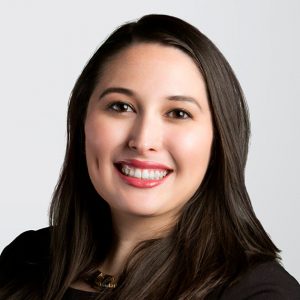
Sarah Sowell
Rice University
Houston (29.7° N, 95.3° W)
featuring Adrianne Waddell, Associate, Holland & Knight LLP, Austin (30.2° N, 97.7° W)
Adrianne Waddell is an associate at Holland & Knight LLP living in Austin, Texas. After attending Rice University for a  degree in civil engineering and receiving a law degree from the University of Texas at Austin, Ms. Waddell worked in the public sector for the Office of the General Counsel and the Public Utility Commission.
degree in civil engineering and receiving a law degree from the University of Texas at Austin, Ms. Waddell worked in the public sector for the Office of the General Counsel and the Public Utility Commission.
The biggest takeaway from my conversation with Ms. Waddell is that college is a time to explore —fields, majors, classes, and ideas— but this exploration doesn’t end once you graduate. Instead Ms. Waddell models how law school, and a law career, can offer an opportunity to explore fields such as energy, environmental policy, and engineering. During her time at Holland & Knight, Ms. Waddle has been able to simultaneously focus on a law specialty that suites her interests, ideas, and skills and explore different corners of law. The excerpts below from this interview shows us how her law career provided her a unique chance to choose a field and explore new ones long after she completed her undergraduate education.
Highlights from the interview:
I would like this interview to aim for how we can inform college students on diverse career paths. What do you think were some influential factors that led to your current position?
Since I was 8, I wanted to be a lawyer, but my path of getting here was nothing traditional, or a straight path. I didn’t really have any lawyers in my family. I would meet them through school events or programs, but I didn’t really have a sense of what that actually looks like in reality. So, I think that the things that kept me going towards this path were pre-law educational opportunities and programs, or having friends with similar interests.
I studied engineering at Rice University because of a pre-college program at University of Texas that encouraged STEM academics. I liked math and science and I thought I could be a lawyer with any degree; so, I ended up pursuing that. At Rice, I also studied environmental law within my degree with Professor Jim Blackburn and took some sustainability courses. So, I started figuring out how to mesh these fields with law. Fortunately, these educational opportunities and programs, or the groups I was in helped me get to my career, even though I did not get there through a straight career path.
Since engineering is an unusual major for a lawyer, could you elaborate on why you picked that and how does that affect your current role?
I honestly had the idea after attending an engineering intro program where I heard engineers can do whatever they want. I focused on environmental and sustainability studies. At the end of college, I thought about whether I wanted to work or go to graduate school or do something else. Finally, I realized I didn’t want to do a master’s in engineering and decided to go to law school. Looking back, I do wish I worked as an engineer for a year or two [after I graduated from Rice].
When you go to law school, you realize that so many people come from different backgrounds. You also have a lot of people that have worked [in different fields such as] the medical field or accounting. I do wish I had worked in a technical field for a little bit because I think it would have given me a different perspective in law school, but also a different perspective on the working world.
When I was in law school, intellectual property law was a big area. Just because I had the technical background, people pushed that a lot on me. And I did explore it. I ended up realizing I really did like the energy side of things. I ended up working for the Railroad Commission here in Austin, which is the state regulatory agency that regulates the oil and gas industry. And from there, I ended up at the Public Utility Commission of Texas, which regulates the electric and other utilities. That was energy- and sustainability-based work. From there, I was hired to my law firm job. I currently work with electric companies, and I have a basic understanding of what’s going on, because I have an engineering background, which gives me credibility with them that, otherwise, I might not have. I have tried to tie what I knew together and what made sense to me naturally.
How do you think your family, your culture, and your community shaped your career path and your interest?
My family has always been very supportive. I didn’t have any lawyers in my family; so, there wasn’t any technical advice or specifics my family could give me. I did learn a lot on my own. But that’s also why I love to speak [to students] like you. I learned so much as I went, but I also had a really good community around me. There was a program that I was in throughout middle school and even high school, and it’s called “Con mi Madre,” which is a Hispanic mother-daughter program, that the Junior League used to run. They were very big on college prep and readiness. They were often the leaders of other Austin community groups. So, I’ve known those people since I was in elementary or middle school and I still see them to this day. They were also founders of the young Hispanic Professional Association of Austin, whose board I joined two years ago, or the Hispanic Bar Association of Austin. They supported me in law school, and now I sit on their board as well. I think they even sponsored a scholarship I had when I was at Rice. I’ve definitely been supported by the community around me in some way, shape, or form in whatever path I’m on at that moment or helping me get to the next step.
What are some of your projects or accomplishments you’re most proud of?
I would say that within the last couple of years, I’ve been taking on more direct roles in case management or handling hearings and depositions firsthand instead of just being the person behind the curtain. You are either writing the pleadings, or doing the prep for a hearing. I think the biggest thing for me is being someone my clients are comfortable calling directly. I’m fortunate that the department I work with fosters that environment and that my clients can call me up directly and say “I need help with this project,” or “we just had this incident happen and need to start preserving evidence, or we’re probably going to get sued on this.” I’m in my sixth year; so, I’m still an associate, but I’ve built up enough trust from my clients.
What kind of projects do you work on? How would you quickly describe your current work?
Anything and everything. My practice encompasses litigation and transactional and regulatory work, and general advice. One day, I could be working on a regulatory project before the state, the next day I could be working on a breach of contract suit for a company that has nothing to do with electricity. Then the next day, I could be looking at someone’s bylaws or board resolutions to help them with corporate governance. Part of that is that we are a general counsel to a certain group of clients. And there are some days where I’m just the middleman trying to get people connected together so that they can do the work I can’t do.
Lately, I’m learning new things, which is nice, because sometimes you can get caught in a monotony of a certain type of work. Fortunately, one thing I’ve been learning to do, as I get higher in my career and move from being an associate to hopefully a partner, is learning how to generate business and pitch myself for new things. I am approaching those things as a learning opportunity. I am trying to learn how to put myself out there more and advance my career in terms of learning new things and generating new business and opportunities.
Taking initiative is definitely a great skill for a college student, and learning as well. What advice do you have for students interested in law?
Contact lawyers and get to know them. Lead informational interviews. Lawyers love to talk in general. I think this equally applies to college students and I’m always happy that students reach out. Our schedules can get very busy; so, I always tell them to be persistent. Taking the initiative speaks volumes to me, especially when someone takes the initiative to contact me. I really do try to always get back to them and make sure we meet. I also think there’s no better way to learn what [lawyers] are doing and what it actually looks like to be a lawyer, what all your options in law are. You would be amazed at how many people with law degrees and aren’t practicing law. I think all those things are so important to figure out. I’ve thought so many times about what I wanted to do with my career in 15 years or 20 years? Do I want to be at a law firm? Do I want to be practicing law in the typical sense? Or do I want to be working at a corporation at a managerial role or compliance role? There are so many different options.
When I was working at the state, I thought I would work there for two years and then start looking for jobs in a law firm, but I got called within my first year of practice. My mentor that I’d known for four or five years at that point had just moved to this law firm and said that they were looking to hire. They didn’t give me a job off the spot; I still had to interview for it, but my job was never posted online. It was never formally out there. So, your personal network helps you get jobs within this industry.
I think taking the initiative to meet with lawyers, getting to know people, and asking questions will help you learn the ropes basically. Also, take advantage of any opportunity to do a clerkship or even just a day program.
Interview excerpts have been lightly edited for clarity and readability and approved by the interviewee. This article only aims to share personal opinions and learnings and does not constitute the interviewee’s current or former employer(s)’ position on any of the topics discussed.
